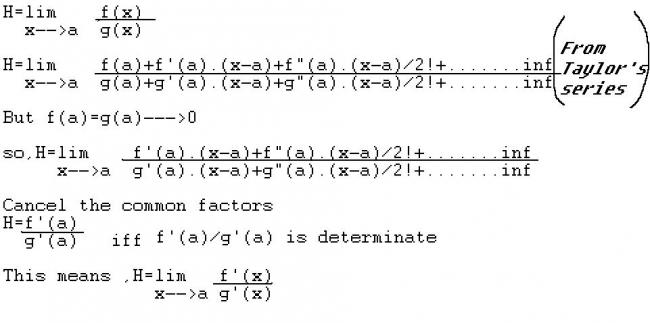
Give the proof of LH rule when f(a)=0 and g(a)=0
f(x) is the numerator and g(x) is the denominator...
Trust me it is not very difficult..
Use the basic definition of Derivative...
(Sorry mistake galti ho gaya.)
-
UP 0 DOWN 0 0 16

16 Answers
but sir why would we apply LH rule then?????????????????because it wont be indeterminate then.....
if both are in num. then the limit should be 0 :) what was to prove...........?........?....?
sorry galti ho gaya...
bhawna ko samjo ;)
aise haan this was not the proof i was looking for eureka.. but still this is good enuf...
There is a more "elegant" proof...
If we take derivative of both num and den... we cancel 0 making factor.. if both have only one root at that pt... diff 1nce is enough if two repeated roots then f'(x) will have one root so f'(a) will be also 0 so we have to diff again ...
Ltx→af(x)/g(x) =Lt h→0 f(a+h)/g(a+h)
=Lth→0 f(a+h)-f(a)/g(a+h)-g(a) ((using g(a)=f(a)=0))
=Lth→0 (f(a+h)-f(a)/h)/(g(a+h)-g(a)/h)
=Lt x→a f'(x)/g'(x)
was this what u where expecting or r u expecting some thing other than this
bhaiya aap aise 'also' likhke bhawnao ko zaahir kiye ki hum sab samajh ke bhi soch rahe the ... ki jo hum samjhe woh hume nahi samajhna chaiye tha.. [3] [3]
kya mast shayari padete hi hum bhool gaye ham kya karne aaye the aur kya gaye waah!waah!waah!waah!waah!waah!waah!waah!waah!waah!waah!waah!waah!waah!waah!waah!waah!waah!waah!waah!waah!